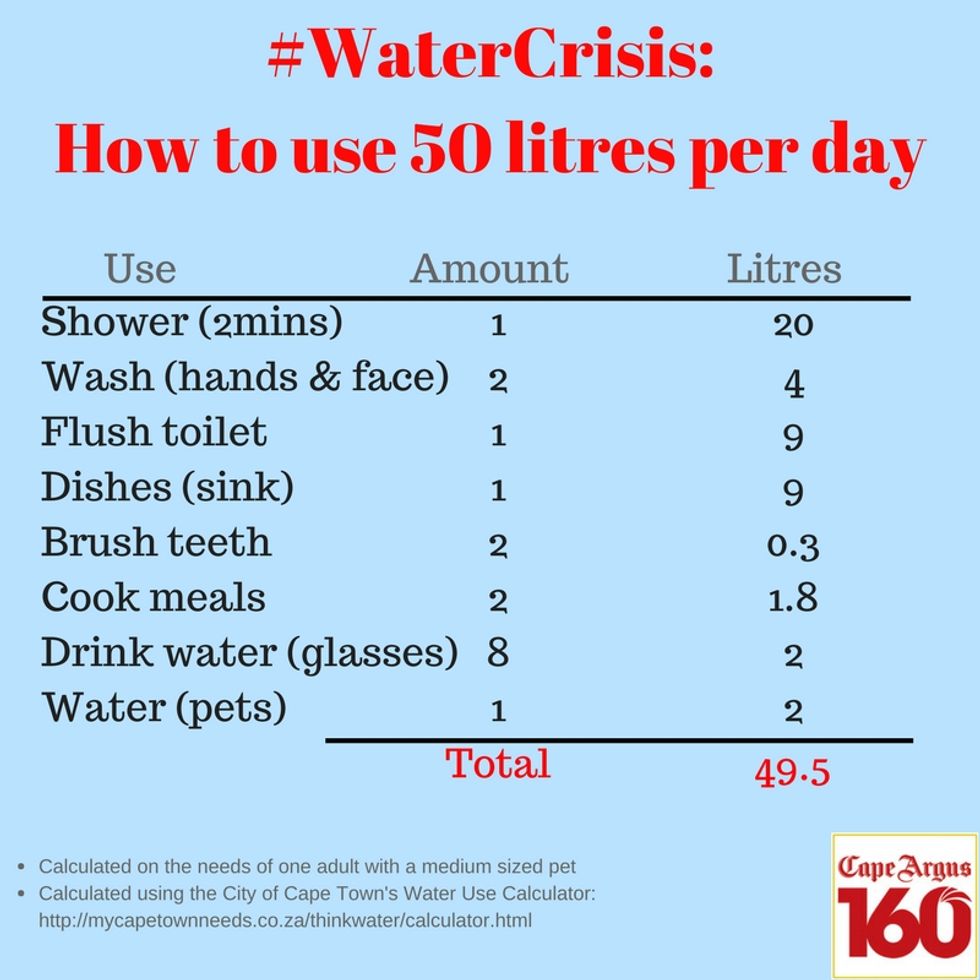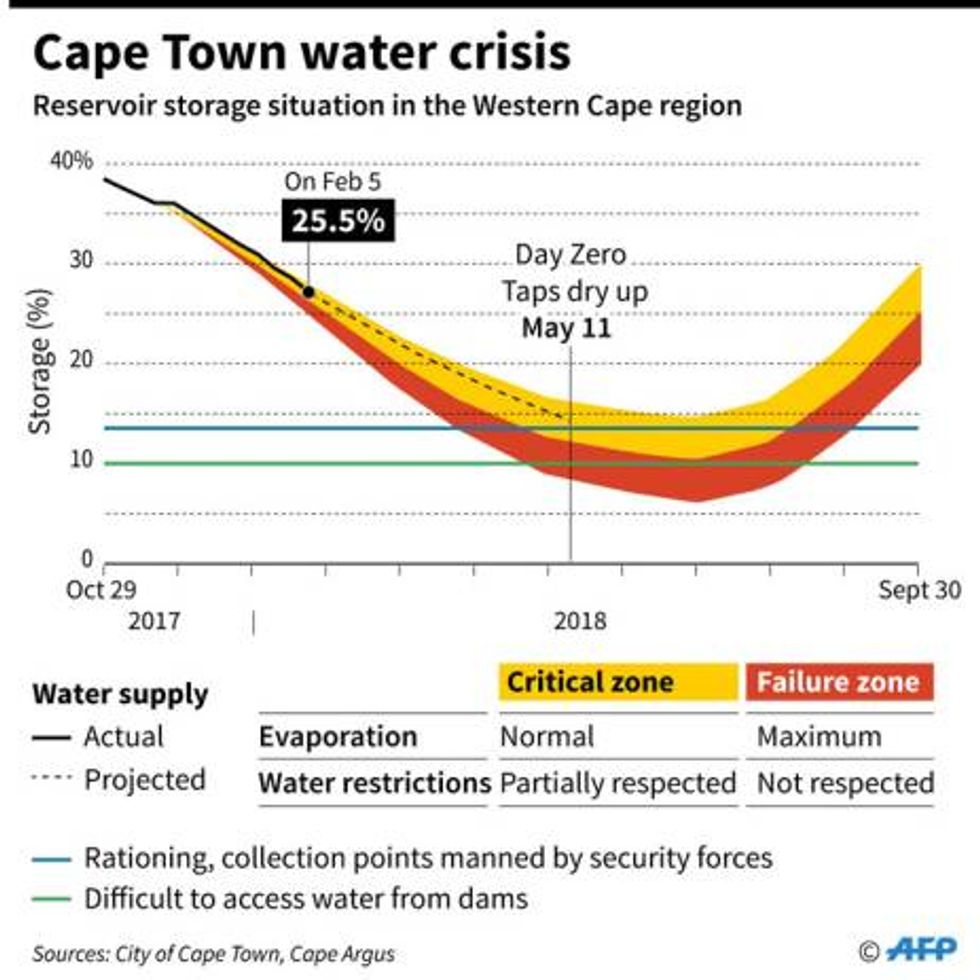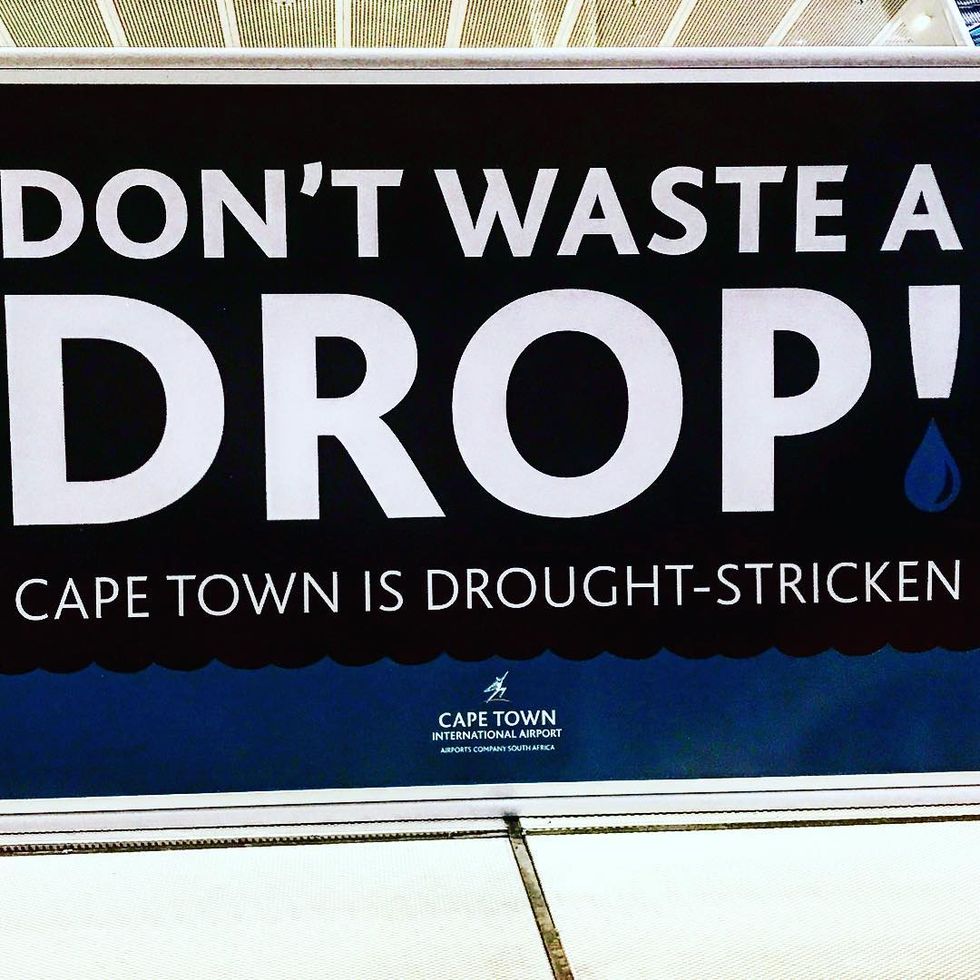Cape Town, South Africa is having the worst drought ever recorded in its history, stretching over the last three years.
As dam levels reach a critical low there is cause for concern over the lack of water for municipal use (i.e., showering, hand washing, drinking, cooking, washing, etc.) As of right now (February 7th, 2018) the dam levels for Cape Town sit at 25.2 %, noting that the last 10% of dam water is unusable due to the amount of salt and debris. So the City of Cape Town has noted a "Day Zero", in which the dam levels will reach 13.5% and all municipal water will be turned off except for vital services.
In an effort to avoid a "Day Zero" situation the city has implemented level 6B water restrictions as of February 1st, 2018. Meaning that every person in Cape Town is now limited to 50 liters (13.2 gallons) of water per day.
A stark comparison to the typical American who uses an average of 80-100 gallons of water per day. As well as the average Cape Town usage has been dropped to the target of 450 liters (119 gallons) per day for a city of a little over 400,000.
As a study abroad student I have been living in Cape Town for 2 weeks and have felt the effects of the water restrictions since day one.
Within our house in Observatory, we are all limited to a 3-minute shower and are advised to only shower every couple of days. Those showers consist of wetting our hair and body, turning off the water, then shampooing/conditioning and washing our body, then turning back on the water to rinse off, done!
A far cry from the relaxing steamy shower in the United States, filled with sudsy bubbles and singing. Going through this process had made me appreciate the privileges we have in the US, most we don't even realize.
Recently we have put a bucket in our shower to catch any excess water that would be going down the drain, we refer to as "grey water". This will be used to flush toilets in the case of our water being turned off. Above the toilets, we have signs that read, "If it's YELLOW, let it mellow. If it's BROWN, flush it down."
Translating to, if you just peed don't flush, but if you did other business, flush. Which would seem gross to most, but in actuality has become a habit since living here. I think as humans we quickly adapt to situations we are put in, and for most of my group, this has been the case.
We also do not wash off our dishes before they go into the dishwasher, once the food is scraped into a trash can the dish goes directly in the dishwasher as to save water. When boiling water for pasta or other foods we recycle that water to be used a grey water in an effort to increase our supply.
In the event that an actual "Day Zero" happens, all municipal water will be turned off in Cape Town, excluding vital services. Meaning residents will have to collect water from one of the 200 collection sites around the city, which limit 25 liters (6.6 gallons) per person. With security and law enforcement deployed at each site to reduce possible violence.
If "Day Zero" arrives it is likely the restrictions will last for months. "We should be prepared to live with very little water for at least three months and possibly up to six months after Day Zero, but it all depends on when rain falls in the water source areas that feed the dams," said WWF in a statement.
Recently there has been fluctuation in the actual date of "Day Zero", two weeks ago the date was moved up from April 29th to April 16th, but within the last few days, it has been pushed back to May 11th.
As for life out in Cape Town, most restaurants and bars have signs out that state they will not be giving out water unless it is specifically asked for, and in some cases, a bottle of water must be purchased. When waiting in the line for customs at the Cape Town International Airport there are giant signs displayed regarding the water crisis, and reminding tourists and locals to save water.
The University of the Western Cape, where my group of study abroad students attend, has been publically posting signs all around campus regarding the severity of the water crisis. Even going as far a to place large signs depicting where the dam levels sit currently as a way to reach students who do not understand the current situation.
While the water crisis has been widely covered by national media outlets, it's hard to understand exactly what's going on here until you're on the ground living it. That's just my experience from two weeks! For people who have grown up here, and dealt first hand with the current three-year drought they would have much more to say than me.
In retrospect, coming here I was scared of the water crisis and what it would mean for my experience. But I shouldn't have been.
While living a sheltered life in the States it was very easy of me to be scared of things I did not know or understand. When in real life this is just another way of living, a normality for hundreds of thousands of people. I think what the media fails to cover is the resilience of the people of Cape Town and the reality of the situation.
I'm grateful for the people of Cape Town and their hospitality since I have been here. I have nothing but amazing experiences from my short two-weeks here, and I cannot wait for the rest of my adventure to unfold.


















